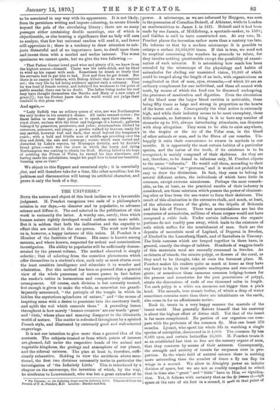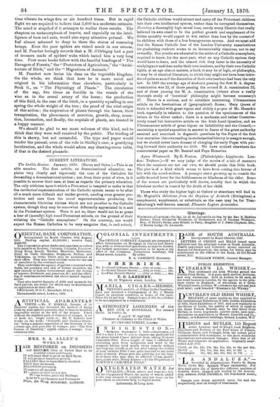THE UNIVERSE.*
• The Univeree; or, the Infinitely Greta and the Infinitely Little. Translated from the
French of F. A. Pouchet, M.D. London : Mackie and Son. BOTH the nature and object of this book incline us to a favourable judgment. M. Pouchet recognizes two ends of a philosopher's mission in our days,—to discover and to popularize, to advance science and diffuse it. The end selected in the publication of this work is eminently the latter. A worthy one, surely, than which human nature rightly developed would confess none more noble. But it is seldom that both the inclination and the capacity to effect this are united in the one person. The work now before us is, however, a happy instance of this union. M. Pouchet is a Member of the Institute of France. His name is known among savants, and where known, respected for ardent and conscientious investigation. His ability to popularize will be sufficiently demon- strated by the present volume. The method observed is simply eclectic ; that of selecting from the countless phenomena which offer themselves to a student's view, such only as must charm even the least sensitive intelligence and stimulate it to wonder and admiration. But this method has been so pursued that a general view of the whole panorama of nature passes in fact before the reader's notice in harmonious and comparatively exhaustive arrangement. Of course, each division is but cursorily treated, but enough is given to make the whole, as somewhat too grandi- loquently announced, "the peristyle of the temple in which lie hidden the mysterious splendours of nature," and " the means of inspiring some with a desire to penetrate into the sanctuary itself, and uplift the veil which conceals them." A prevailing lesson throughout is how merely ' human counters' are our words ' great' and little,' whose place and meaning disappear in the illimitable world of nature. The matter is refreshed throughout by a spirited French style, and illustrated by extremely good and well-selected engravings.
It is not our intention to give more than a general idea of the contents. The subjects treated or from which points of interest are gleaned, fall under the respective heads of the animal and vegetable kingdoms, the geology and atmosphere of our planet, and the sidereal universe. The plan at least is, therefore, suffi- ciently exhaustive. Holding in view the antithesis above men- tioned, the first two divisions necessarily invite in particular the investigation of 'the Infinitely Little.' This is introduced by a chapter on the microscope, the invention of which, by the way, he attributes to Leuwenhoeck, who was but a great extender of its
power. A microscope, as we are informed by Huygens, was seen in the possession of Cornelius Debrell, of Alkinaar, while in London as mathematician to James I. in 1621. Debrell said it had been made by one Jansen, of Middleburg, a spectacle-maker, in 1590; and Galileo is said to have constructed one. At any rate, M. Pouchet places the invention rather more than a century too late. He informs us that by a modern microscope it is possible to enlarge a surface 56,000,000 times. If this is true, we need not be sceptical concerning the wonders he proceeds to relate, for they involve nothing questionable except the possibility of exami- nation of such minutiae. It is astonishing how much has been revealed by the microscope of the physiology and habits of animalcules far eluding our unassisted vision, 10,000 of which could be ranged along the length of an inch, with organizations as complicated as that of man, eyes, stomachs,—of which 20 are an ordinary complement for one individual, and these all coated with teeth, by means of which the food can be discerned undergoing the processes of mastication and digestion. Even the circulation of the blood near the larger blood cavities is noticeable, these being fifty times as large and strong in proportion as the hearts of the horse and ox. Consequently the vital action is extremely high, and while their industry seems to be most exemplary, these little animals, so fortunate a thing is it to have any number of stomachs up to 100, always introducing stimulants, can dispense with sleep altogether. They seem to be able to exist anywhere, in the tropics or the ice of the Polar seas, in the blood of other animals or man, and in the fibres of our muscles. Un- happily it suits their convenience to swarm in myriads in our mouths. It is apparently the most certain habitat of a particular species, and the tartar of the teeth, if its existence is to be recognized, is mainly composed of their skeletons. As they are not, therefore, to be found in infusions only, M. Pouchet objects to the name " infusoria." He would call them, according to their nature, " microzoa " or " protozoa," and it would not probably be easy to draw the distinction. In fact, they seem to belong to several different orders, the individuals of which have little in common, except extreme minuteness. Perhaps the most remark- able, as far, at least, as the practical results of their industry is considered, are those microzoa which possess the power of eliminat- ing silex or lime from the sea-water to form their skeletons. The result of this elimination is the extensive chalk, and much, at least, of the silicious strata of the globe, as the tripolis of Bohemia and the Isle of France. These vast accumulations are but the cemeteries of animalcules, millions of whose corpses would not have composed a cubic inch. Under certain influences the organic portions do not readily pass away, which leads to the existence of soils which suffice for the nourishment of man. Such are the deposits of mountain meal of Lapland, of Degernii in Sweden, of Ebsdorf in the Lunenburg Heath, and of Santafiora in Tuscany. The little caresses which are heaped together in these have, in general, exactly the shape of ladders. Hundreds of waggon-loads of this mountain meal are annually consumed in Sweden. As architects of islands, the minute polypi, or flowers of the coral, as they used to be thought, take at once the foremost place. M. Pouchet makes his readers quite as much at home as they have any fancy to be, in their exquisite madrepores and rose-coloured grots ; or sometimes these immense common lodging-houses for the present and cemeteries for the past generations of polypi, attain the dimensions of reefs of one thousand miles in length. Yet each polyp is a white sea anemone not bigger than a pin's head. The monads, true atomic bodies, of which a drop of water sometimes contains more than there are inhabitants on the earth, also come in for an affectionate notice.
Book iii. treats in a very happy manner the marvels of the insect world. Man generally flatters himself that his anatomy is about the highest effort of divine skill. Yet that of the insect is far more complicated. No portion of our organism can com- pare with the proboscis of the common fly. Man can boast 870 muscles. Lyonet, who spent his whole life in watching a single species of caterpillar, discovered in it 4,000. The common fly has 8,000 eyes, and certain butterflies 25,000. M. Pouchet treats it as an established fact that so fine are the sensory organs of ants, that they converse by means of their antenna;. Consequently, the strength and activity of insects far surpasses ours in pro- portion. In the whole field of natural science there is nothing more astounding than the number of times a fly can flap its wings in a second. We allow to Almighty power an infinite division of space, but we are not as readily compelled to admit that in time also " great " and "little" have to Him ,va significa- tion. Yet, it follows with certainty that as the fir passes th-Jugh space at the rate of six feet in a second, it mast in that point of
time vibrate its wings five or six hundred times. But in rapid flight we are required to believe that 3,600 is a moderate estimate. The mind is stupified if it attempts to realize these results. The chapters on metamorphosis of insects, and especially on the intel- ligence of bees and ants, would also repay attentive perusal. We feel almost ashamed to deny to these the status of reasoning beings. Even the poor spiders are raised much in our esteem, and M. Pouchet lovingly records that a M. d'Orbigny had a pair of trousers made of spiders' webs which lasted him a very long time. Four more books follow with the fanciful headings of " The Ravagers of Forests," the "Protectors of Agriculture," the "Archi- tecture of Birds," and the " Migrations of Animals."
M. Pouchet now levies his dues on the vegetable kingdom. On the whole, we think that here he is more novel and original in his information than elsewhere, particularly in Book ii., on " The Physiology of Plants." The circulation of the sap, five times as forcible in the vessels of the vine as in the crural artery of the horse ; the production of this fluid, in the case of the birch, in a quantity equalling in one spring the whole weight of the tree ; the proof of the vital origin of this action ; the respiration of plants through the leaves, their transpiration, the phenomena of secretion, growth, sleep, sensa- tion, locomotion, and finally, the nuptials of plants, are treated in a happy manner.
We should be glad to see more volumes of this kind, and to think that they were well received by the public. The binding of this is showy, but not untasteful. The type and paper would render the perusal, even of the rule in Shelley's case, a gratifying lucubration, and the whole would adorn any drawing-room table, if that is the desired pinnacle.































 Previous page
Previous page